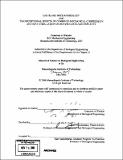Cartilage mechanobiology and transcriptional effects of combined mechanical compression and IGF-1 stimulation on bovine cartilage explants
Author(s)
Wheeler, Cameron, 1978-
DownloadFull printable version (5.002Mb)
Other Contributors
Massachusetts Institute of Technology. Biological Engineering Division.
Advisor
Alan J. Grodzinsky.
Terms of use
Metadata
Show full item recordAbstract
Background: Investigators have focused on mechano-regulation of upstream signaling and responses at the level of gene transcription, protein translation and post-translational modifications. Intracellular pathways including those involving integrin signaling, mitogen activated protein kinases (MAPKs), and release of intracellular calcium have been confirmed in several laboratories. Studies with IGF-1: Insulin-like growth factor-I (IGF-1) is a potent anabolic factor capable of endocrine and paracrine/autocrine signaling. Previous studies have demonstrated that mechanical compression can regulate the action of IGF-1 on chondrocyte biosynthesis in intact tissue; when applied simultaneously, these stimuli act by distinct cell activation pathways. Our objectives were to elucidate the extent and kinetics of the chondrocyte transcriptional response to combined IGF-1 and static compression in cartilage explants. Discussion: Clustering analysis revealed five distinct groups. TIMP-3 and ADAMTS-5, MMP-l and IGF-2, and IGF-1 and Collagen II, were all robustly co-expressed under all conditions tested. In comparing gene expression levels to previously measured aggrecan biosynthesis levels, aggrecan synthesis is shown to be transcriptionally regulated by IGF- 1, whereas inhibition of aggrecan synthesis by compression is not transcriptionally regulated. (cont.) Conclusion: Many genes measured are responsive the effects of IGF-1 under 0% compression and 50% compression. Clustering analysis revealed strong co-expressed gene pairings. IGF-1 stimulates aggrecan biosynthesis in a transcriptionally regulated manner, whereas compression inhibits aggrecan synthesis in a manner not regulated by transcriptional activity.
Description
Thesis (S.M.)--Massachusetts Institute of Technology, Biological Engineering Division, February 2007. Includes bibliographical references.
Date issued
2007Department
Massachusetts Institute of Technology. Department of Biological EngineeringPublisher
Massachusetts Institute of Technology
Keywords
Biological Engineering Division.